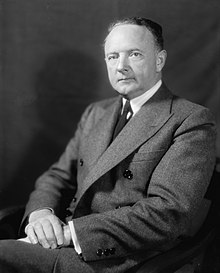Harry Flood Byrd
| Harry F. Byrd | |
|---|---|
 |
|
|
United States Senator from Virginia |
|
|
In office March 4, 1933 – November 10, 1965 |
|
| Preceded by | Claude A. Swanson |
| Succeeded by | Harry F. Byrd, Jr. |
| 50th Governor of Virginia | |
|
In office February 1, 1926 – January 15, 1930 |
|
| Lieutenant | Junius Edgar West |
| Preceded by | Elbert Lee Trinkle |
| Succeeded by | John Garland Pollard |
| Member of the Virginia Senate from the 26th district |
|
|
In office January 9, 1924 – February 1, 1926 |
|
| Preceded by | James M. Dickerson |
| Succeeded by | Joseph S. Denny |
| Member of the Virginia Senate from the 10th district |
|
|
In office January 12, 1916 – January 9, 1924 |
|
| Preceded by | Frank S. Tavenner |
| Succeeded by | Marshall B. Booker |
| Personal details | |
| Born |
Harry Flood Byrd June 10, 1887 Martinsburg, West Virginia, U.S. |
| Died | October 20, 1966 (aged 79) Berryville, Virginia, U.S. |
| Political party | Democratic |
| Spouse(s) | Anne Douglas Beverley |
| Children |
Harry, Jr. Bradshaw Richard Beverley |
| Religion | Episcopalian |
| Signature | |
Harry Flood Byrd, Sr. (June 10, 1887 – October 20, 1966) of Berryville in Clarke County, Virginia, was an American newspaper publisher, and for four decades political leader of the Democratic Party in Virginia as head of a political faction that became known as the Byrd Organization. Byrd served as Virginia's governor from 1925 until 1929, then represented the Commonwealth as a United States Senator from 1933 until 1965. He came to lead the "conservative coalition" in the United States Senate, and opposed President Franklin Delano Roosevelt, largely blocking most liberal legislation after 1937. His son Harry F. Byrd, Jr. succeeded him as U.S. Senator, but ran as an Independent following the decline of the Byrd Organization.
Byrd succeeded to what had been the Virginia Democratic Party organization of U.S. Senator Thomas Staples Martin (who died in 1919). Elected the 50th Governor of Virginia in 1925, initially Byrd reorganized and modernized Virginia's government. His political machine dominated state politics for much of the first half of the 20th century.
Financial conditions in Virginia during Byrd's youth conditioned his thinking on fiscal matters and "pay-as-you-go" financial policies. Byrd was vehemently opposed to racial desegregation of the public schools, and was leader of "massive resistance", a campaign of opposition to the U.S. Supreme Court decisions in Brown v. Board of Education that led to closure of some public schools in Virginia in the 1950s. Students who were denied their education in several Virginia counties became known as the "lost generation." Byrd was perceived as a racist and avowed white separatist. Although paying his black and white workers similarly, Byrd was vehemently opposed to racial desegregation even early in the New Deal, and later opposed Presidents Harry S. Truman and John F. Kennedy despite their also being Democrats (as well as losing Democratic Presidential candidate Adlai Stevenson) because they opposed racial discrimination within the federal workforce. The Byrd Organization also benefitted from limiting the political participation of blacks and poor whites in Virginia by means of poll taxes and literacy tests, but managed to crush opposition ranging from New Deal Governor James H. Price to gubernatorial and senatorial candidate Francis Pickens Miller. Although Byrd never announced as a presidential candidate, he received many votes in the 1956 presidential election and 15 electoral votes in the 1960 presidential election.
...
Wikipedia
